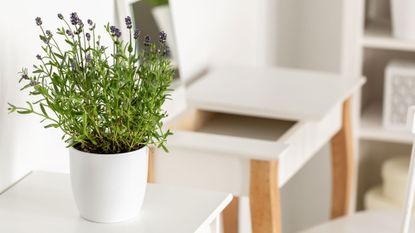How to care for lavender plant indoors – 8 tips from pro gardeners
Growing lavender plant indoors comes with challenges, but with this expert advice your houseplant will flourish


Try a lavender plant indoors for a houseplant that demands little maintenance, yet still brings a touch of color and warmth to your interiors. This plant is subtle, cheers up a neutral scheme with its beautiful purple hue, and is suitable for a variety of rooms, from the bathroom and bedroom where it produces a calming aroma, to the kitchen where it makes for a nice touch of French farmhouse style.
Plus, it's one of the best houseplants for beginners. 'A lavender plant is an easily maintained houseplant since it requires very little attention, has a subtle, pleasant aroma, and gives back since it’s considered an edible herb,' says gardening expert Lindsay Pangbor of New York's Bloomscape, a florist with five generations of greenhouse growers and floral industry innovators. 'They’re great gifts, especially for those looking to add color or fragrance to their living spaces or upgrade their indoor edible garden for a wider variety of herbs,'
For those looking to bring this plant into their homes, this is our guide for how to care for your lavender plant indoors.
How to pot your lavender plant indoors
First thing's first, think about how you are going to pot your lavender plant for an indoor setting. An indoor pot in a silvery shade, slate grey or bright blue china will complement the purple of the flower.
Consider the size of your plant. You will want a pot that has room for your lavender to grow and expand, and you will want a good depth for the roots to take to the soil.
Also think about drainage. 'I recommend planting lavender in a pot that has a drainage hole,' says Lindsay from Bloomscape.
'Lavender plants can decline quickly if their roots remain wet for too long, so a pot with drainage ensures you can water thoroughly without fear of root rot.'
Use a plastic pot within your larger pot to allow irrigation. Alternatively, terracotta is a good idea. 'It can be a great material since it helps wick excess moisture away from the roots.' As a bonus, terracotta as a color looks beautiful with purple and can make for a nice homage to Provence, where lavender grows in abundance and French houses are blessed with charming terracotta rooftops.
How much does your lavender plant need watering?
Next, think about how often you should water your houseplant. Because of their Mediterranean heritage, lavender plants are very low-maintenance when it comes to their watering needs.
'The plant requires water only when its soil is completely dry,' explains Lindsay. 'When watering, make sure you are watering deeply, doing so until the water flows through the pot and out of the drainage holes at the bottom. Make sure to also discard any excess water that accumulates in the saucer.
Solomiia Yaskiv from the plant care app, PlantIn advises to reassess your lavender's water intake based on what period of growth it is in. 'During the period of forming, it does need regular watering.'

How much sunlight does your lavender need?
While lavender can tolerate lower light for short periods, they perform best with a good stint of direct sun during the spring and summer. 'If grown indoors, choose a spot very close to a south or west facing window,' says Lindsay. 'A grow light can also help to give an extra boost.'
Solomiia suggests that the perfect amount is six hours a day of full sunlight. 'Think of the pretty lavender fields in Provence - this is the perfect spot for the plants that bathe in the sun.'
Jason White, CEO of gardening blog, All About Gardening, advises the best place for your indoor lavender to soak up the sun is by a window. 'But remember there must also be good ventilation when growing them indoors. For the best results, put it on a windowsill and rotate and allow for some air to flow through,' he adds.
How to encourage lavender's smell?

To enjoy the lavender’s perfumed fragrance, rub the plant and run your hand along its leaves to release its scent. You can also cut its flowers or leaves which can be dried and hung around the house. This makes for a nice flourish and will help retain their fragrance.
How to encourage lavender's flower
The leaves of lavender are a unique color and a delicate mix of purple, blue and grey. 'They also produce purple or pink blooms when grown in lots of direct light and heat,' says Lindsay.
'To encourage flowering, try moving your lavender outdoors for a short period of time during the summer. When grown indoors, lavender plants may not produce flowers, but their leaves can still add flavor and aroma.'
How to maintain lavender?
Lavender is a great houseplant for beginners, and its upkeep is relatively easy but you must pay close attention. Fertilize your lavender plant every one to two months through the spring and summer months with a general purpose fertilizer. 'Trimming the ends of the stems, like when you harvest from the plant, is a great way to shape the plant and encourage branching to create a fuller plant,' adds Lindsay.
Be The First To Know
The Livingetc newsletter is your shortcut to the now and the next in home design. Subscribe today to receive a stunning free 200-page book of the best homes from around the world.

Oonagh is a content editor at Livingetc.com and an expert at spotting the interior trends that are making waves in the design world. Writing a mix of everything and everything from home tours to news, long-form features to design idea pieces on the website, as well as frequently featured in the monthly print magazine, she's the go-to for design advice in the home. Previously, she worked on a London property title, producing long-read interiors features, style pages and conducting interviews with a range of famous faces from the UK interiors scene, from Kit Kemp to Robert Kime. In doing so, she has developed a keen interest in London's historical architecture and the city's distinct tastemakers paving the way in the world of interiors.
-
 How to Thaw a Frozen Pipe — Learn Everything You Need to Know in 5 Minutes With This Guide
How to Thaw a Frozen Pipe — Learn Everything You Need to Know in 5 Minutes With This GuideWinter storm caught you off guard? We asked an expert — just how do you thaw a frozen pipe?
By Hugh Metcalf Published
-
 The 12 Very Best Silk Bedding Pieces — As Our Style Editor Says: 'It's What Dreams Are Made Of!'
The 12 Very Best Silk Bedding Pieces — As Our Style Editor Says: 'It's What Dreams Are Made Of!'Slumber in lustrous luxury with the very best silk bedding sheets, duvets, pillowcases, and more — your sleep score will thank us later
By Julia Demer Published

